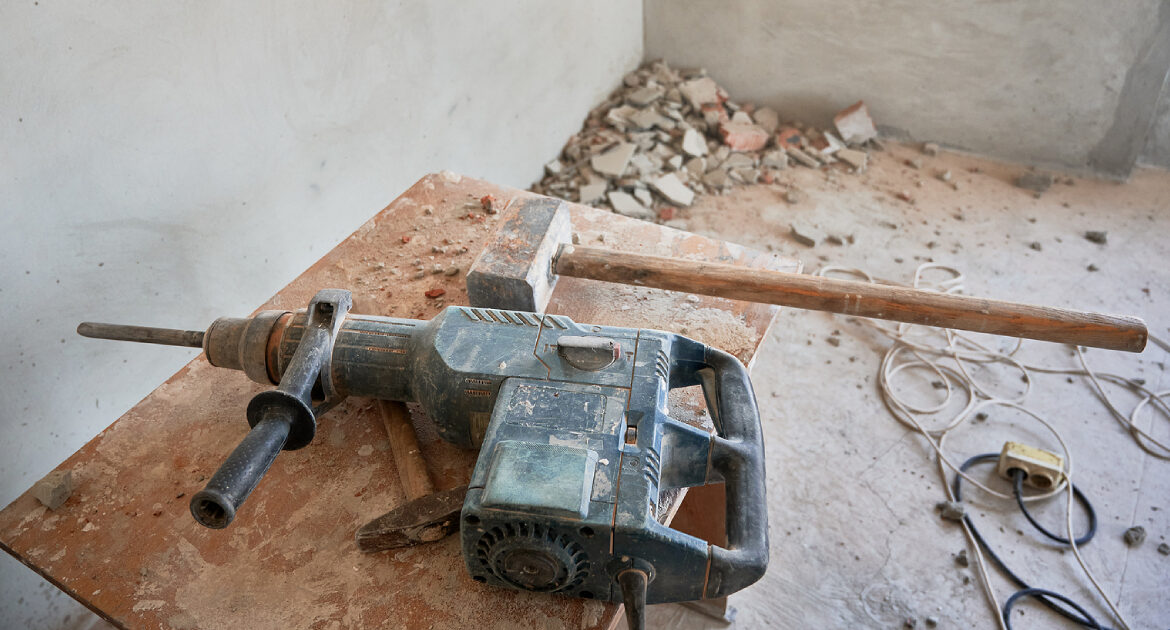Renovating your home can be one of the most exciting journeys, whether you’ve just collected your keys or are finally making that long-awaited upgrade to your space. From choosing tiles and cabinetry to selecting your preferred lighting, every detail adds a personal touch. It’s your chance to create a home that reflects your lifestyle and values.
But before diving into any kind of renovation work, particularly when it comes to hacking or demolishing walls and fixtures, there are essential rules and regulations to follow, especially if you live in an HDB flat or a private condominium. These structures are subject to specific legal and safety standards that help maintain the integrity of the building and ensure safety for all residents. Understanding the proper process is key to avoiding unnecessary delays, penalties, or, worse, compromising the safety of your home.
Understanding HDB hacking & demolition rules
If you’re living in an HDB flat and thinking of removing a wall, hacking tiles, or tearing down part of your bathroom, there’s no such thing as a ‘simple’ job. HDB has strict guidelines to ensure that any form of demolition does not affect the building’s structural integrity.
Before any work begins, you must engage an HDB-registered renovation contractor, who will apply for the necessary permits via the HDB e-Service portal. The contractor must also submit detailed plans specifying what is to be hacked or removed. The application will then be reviewed by HDB, and only upon approval can any hacking commence.
Walls that are load-bearing or shared with neighbouring units are typically not allowed to be tampered with. If you’re unsure whether a wall is structural, it’s best to seek professional advice. HDB also requires an on-site inspection before granting approval in some cases. Unauthorised works can lead to hefty fines and a legal order to reinstate everything at your own cost.
Another often-overlooked aspect is the timing and noise regulation. HDB enforces rules that only allow noisy renovation works, including excessive hacking, to be carried out from 9am to 5pm on weekdays, with no noisy works allowed over weekends and public holidays.
Condo hacking & demolition: A different set of rules
Living in a private condominium gives you a bit more freedom in terms of design and layout, but that doesn’t mean you can start hacking away without checks. Condo management bodies (MCSTs) usually require you to submit renovation plans, including any proposed demolition, for review.
Even if your works don’t touch any structural elements, you will likely need to submit professional drawings from your contractor and agree to certain conditions, such as a deposit, restricted working hours, and proof of contractor insurance. In some condos, hacking works must be done within a limited renovation window, often within three months of key collection.
Condo rules can also differ in terms of approved materials, lift protection requirements, and permissible types of noise-generating tools. And while you’re at it, don’t forget to notify your neighbours, as it’s common courtesy and can prevent unnecessary disputes.
What needs approval?
Whether in an HDB flat or private condo, the following typically require official approval:
- Hacking or demolishing non-load-bearing walls
- Removing floor or wall tiles
- Relocating bathroom fixtures
- Creating open-concept kitchens
- Converting your toilet for accessibility
On the other hand, non-structural cosmetic works like painting, installing cabinetry, or changing lighting fixtures usually don’t require permits, but it’s still good practice to inform the relevant authorities or management.
Structural integrity and safety
Demolishing parts of your home without a clear understanding of the building’s structure can have dangerous consequences. Even if the wall seems “non-essential”, it may contain electrical wiring or plumbing. Always consult a professional before making decisions, especially in older properties.
One important part of structural planning is the choice of flooring material. For example, concrete screed flooring is a popular base layer used before finishing materials like tiles or vinyl are applied. It offers a level and sturdy surface, but improper application during hacking or renovation can lead to uneven floors or hairline cracks. If you’re planning major changes to your flooring, ensure your contractor is well-versed in its handling and reinstatement.
Acrovyn® Wall Protection and Latham Expansion Joints: Why they matter
When undertaking a renovation, you may also want to think about future-proofing your home, especially high-traffic or high-impact areas like corridors, lobbies, or staircases.
Acrovyn® Wall Protection is one such solution. It’s a durable wall protection product designed to shield walls from wear and tear, especially in homes with young children, pets, or ageing family members. Leong Yik Engineering & Contractor specialises in supplying and installing Acrovyn® in Singapore, offering both functional and aesthetic options that complement your renovation goals.
Another specialised product is the Latham Expansion Joint, designed to manage movement in buildings caused by thermal expansion, ground settlement, or load variation. These joints are critical in commercial buildings and high-rise condos but are increasingly used in residential spaces that undergo extensive remodelling. As pioneers in Singapore for the supply and installation of Latham Expansion Joints, Leong Yik brings technical knowledge and precision to ensure long-lasting, safe renovations.
Things to consider before hacking or demolition
Before starting any hacking or demolition work, here are some important questions to ask:
- Have you obtained the necessary approvals from HDB or your condo MCST?
- Have you engaged a licensed contractor familiar with the rules?
- Are the walls you plan to hack structural?
- Have you considered the impact on your neighbours?
- Are there electrical, water, or gas lines behind the surfaces?
- Have you planned for dust, noise, and debris management?
Clear communication with your contractor, neighbours, and property managers can make the renovation process smoother and less stressful.
Conclusion
Renovating your home can be a rewarding experience, but it comes with its fair share of regulations, especially when hacking or demolition is involved. Whether you live in an HDB flat or a private condo, understanding the rules and working with experienced professionals will ensure that your renovation is both compliant and safe.
Looking to start your renovation journey the right way? Leong Yik Engineering & Contractor offers specialised services for both HDB and private condo projects, from hacking and demolition to the supply and installation of Acrovyn® Wall Protection and Latham Expansion Joints. Let us help you build the home you’ve always dreamed of, safely and professionally.

